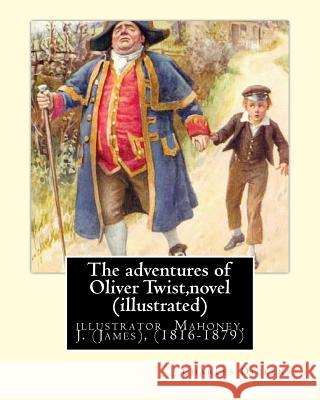The adventures of Oliver Twist, By Charles Dickens and J. Mahoney (illustrator): illustrator Mahoney, J. (James), (1816-1879) » książka
The adventures of Oliver Twist, By Charles Dickens and J. Mahoney (illustrator): illustrator Mahoney, J. (James), (1816-1879)
ISBN-13: 9781535032995 / Angielski / Miękka / 2016 / 274 str.
The adventures of Oliver Twist, By Charles Dickens and J. Mahoney (illustrator): illustrator Mahoney, J. (James), (1816-1879)
ISBN-13: 9781535032995 / Angielski / Miękka / 2016 / 274 str.
(netto: 56,69 VAT: 5%)
Najniższa cena z 30 dni: 57,17 zł
ok. 16-18 dni roboczych.
Darmowa dostawa!
The classic story of a young boy who seeks his fortune on the streets of London. After Oliver Twist asks nasty Mr Bumble for more food, he has to flee the workhouse for the streets of London. Here he meets the Artful Dodger, who leads him to Fagin and his gang of pickpockets. When a thieving mission goes wrong, Oliver narrowly avoids prison and finds himself in the care of kind Mr Brownlow. But Fagin and the brutal Bill Sikes go in search of the young orphan, determined to drag him bac.. Charles John Huffam Dickens ( 7 February 1812 - 9 June 1870) was an English writer and social critic. He created some of the world's best-known fictional characters and is regarded as the greatest novelist of the Victorian era. 1] His works enjoyed unprecedented popularity during his lifetime, and by the twentieth century critics and scholars had recognised him as a literary genius. His novels and short stories enjoy lasting popularity. Born in Portsmouth, Dickens left school to work in a factory when his father was incarcerated in a debtors' prison. Despite his lack of formal education, he edited a weekly journal for 20 years, wrote 15 novels, five novellas, hundreds of short stories and non-fiction articles, lectured and performed extensively, was an indefatigable letter writer, and campaigned vigorously for children's rights, education, and other social reforms. Oliver Twist, or The Parish Boy's Progress, is the second novel by Charles Dickens, and was first published as a serial 1837-39. The story is of the orphan Oliver Twist, who starts his life in a workhouse and is then sold into apprenticeship with an undertaker. He escapes from there and travels to London, where he meets the Artful Dodger, a member of a gang of juvenile pickpockets led by the elderly criminal Fagin. Oliver Twist is notable for its unromantic portrayal by Dickens of criminals and their sordid lives, as well as for exposing the cruel treatment of the many orphans in London in the mid-19th century.The alternate title, The Parish Boy's Progress, alludes to Bunyan's The Pilgrim's Progress, as well as the 18th-century caricature series by William Hogarth, A Rake's Progress and A Harlot's Progress.In this early example of the social novel, Dickens satirizes the hypocrisies of his time, including child labour, the recruitment of children as criminals, and the presence of street children. The novel may have been inspired by the story of Robert Blincoe, an orphan whose account of working as a child labourer in a cotton mill was widely read in the 1830s. It is likely that Dickens's own youthful experiences contributed as well. Oliver Twist has been the subject of numerous adaptations for various media, including a highly successful musical play, Oliver , and the multiple Academy Award-winning 1968 motion picture.











